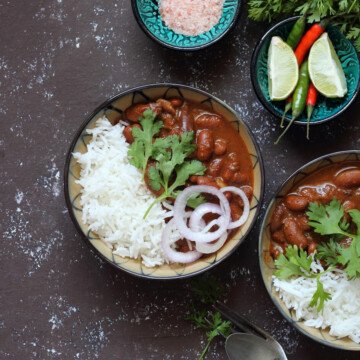
Rajma Rice Recipe
Rajma Rice is a North Indian dish made with kidney beans cooked in a spiced tomato gravy, served over steamed rice. It's rich in flavor, often garnished with fresh coriander, and typically enjoyed with pickles or yogurt.
Ingredients
For the Rajma (Kidney Beans Curry):
- 1 Cup Dried kidney beans (rajma)
- 1 Large onion, finely chopped
- 2 Tomatoes ,finely chopped
- 1 Green chili, slit (optional)
- 1 tablespoon Ginger-garlic paste
- 2 tablespoon Cooking oil
- 1 teaspoon Cumin seeds
- 1 teaspoon Mustard seeds
- 1 teaspoon Turmeric powder
- 1 teaspoon Cumin powder
- 1 teaspoon Coriander powder
- 1 teaspoon Garam masala
- Salt to taste
- 2 Cup Water (or as needed)
- Fresh coriander leaves, chopped (for garnish)
For the Rice:
- 1 Cup Basmati rice
- 2 Cup Water
- 1 teaspoon Oil
- 1 Bay leaf (optional)
- 1-2 Cloves (optional)
Instructions
Prepare the Rajma (Kidney Beans)
- First: Rinse the dried kidney beans in cold water. Then, soak them in plenty of water for 6-8 hours or overnight. This step softens the beans and makes them easier to cook.
- After soaking: Drain the beans and place them in a pressure cooker with 2 cups of fresh water. Cook for about 15-20 minutes until they’re tender.
- Alternatively, if you’re using a regular pot, it will take about 45-60 minutes. Once the beans are cooked, set them aside for later.
Prepare the Rajma Curry
- Now: In a large pan, heat 2 tablespoons of oil over medium heat.
- Next, add cumin seeds and mustard seeds. When they start to splutter, add finely chopped onions and sauté them until golden brown.
- Then: Add ginger-garlic paste and slit green chili (if you like spice). Cook for 1 minute until the raw smell goes away.
- Afterward: Add chopped tomatoes and cook until they soften and the oil separates from the mixture.
- Next up: Stir in turmeric, cumin powder, coriander powder, and salt. Stir well and cook for another 2 minutes.
- Now: Add the cooked kidney beans along with some of their cooking water. Stir to combine everything.
- If needed, add extra water to adjust the consistency.
- Then, lower the heat and let the curry simmer for 15-20 minutes. Add garam masala and stir well. Adjust the salt and spices if needed.
- Finally, garnish with fresh coriander leaves before serving.
Prepare the Rice
- First, rinse 1 cup of basmati rice under cold water until the water runs clear. This removes extra starch and keeps the rice from being sticky.
- Then, in a pot, heat 1 teaspoon of oil over medium heat. Add a bay leaf and cloves (if using), then add the rinsed rice and sauté for 1 minute.
- Next, add 2 cups of water and a pinch of salt 🧂. Bring it to a boil, then lower the heat and cover the pot.
- Simmer for 15-20 minutes or until the rice is tender and the water is absorbed.
- Finally, fluff the rice with a fork.
Serve
- Now, serve the hot Rajma curry over the fluffy basmati rice.
- For extra yumminess, you can also add a side of yogurt or salad for a complete meal.
- Enjoy your delicious homemade Rajma Rice!
Notes
Regional Variations
1. Spicy Rajma: If you love spicy food, you can make your Rajma extra hot by adding green chilies or a dash of chili powder! This will bring a spicy kick to the dish that’ll definitely warm you up. 2. Punjabi Rajma: First off, let's talk about the classic Punjabi Rajma! It's made with a spicy, hearty gravy using tomatoes and onions as the base. Sometimes, it’s finished with a dollop of butter or cream to add richness and make it extra delicious. 3. Kashmiri Rajma: On the other hand, Kashmiri Rajma has a milder, more aromatic taste. It’s made with a special mix of cloves, cinnamon, and dry ginger powder, giving it a warm, unique flavor. 4. South Indian Twist: For a totally different flavor, try a South Indian twist! This version uses a coconut-based gravy and is spiced with mustard seeds, curry leaves, and coconut milk, giving it a creamy and tangy kick.Tips for Leftover Rajma Rice
1. Rajma Rice FrittersMix leftover rice and rajma, shape them into patties, and fry until golden and crispy! They’ll turn into crispy fritters that everyone will love! 2. Rajma Rice Paratha
Leftover Rajma Rice can become stuffed parathas! Simply roll the rice into dough balls, flatten them, and cook on a griddle. Yum! It’s like turning yesterday’s meal into a new one, and it's super tasty! 3. Rajma Rice Soup
Got leftover Rajma Rice? Transform it into soup! Add some broth, extra veggies, and a few spices. Warm and comforting—perfect for a chilly day!
Nutrition
Nutrition Facts
Rajma Rice Recipe
Amount per Serving
Calories
1332
% Daily Value*
Fat
34
g
52
%
Saturated Fat
5
g
31
%
Polyunsaturated Fat
4
g
Monounsaturated Fat
8
g
Sodium
10
mg
0
%
Potassium
1487
mg
42
%
Carbohydrates
165
g
55
%
Fiber
34
g
142
%
Sugar
10
g
11
%
Protein
50
g
100
%
Vitamin B1
0.2
mg
13
%
Vitamin B2
0.1
mg
6
%
Vitamin B3
2
mg
10
%
Vitamin B5
0.5
mg
5
%
Vitamin B6
0.3
mg
15
%
Vitamin C
64
mg
78
%
Vitamin E
1
mg
7
%
Vitamin K
5
µg
5
%
Calcium
80
mg
8
%
Iron
4.9
mg
27
%
* Percent Daily Values are based on a 2000 calorie diet.
Tried this recipe?Let us know how it was!